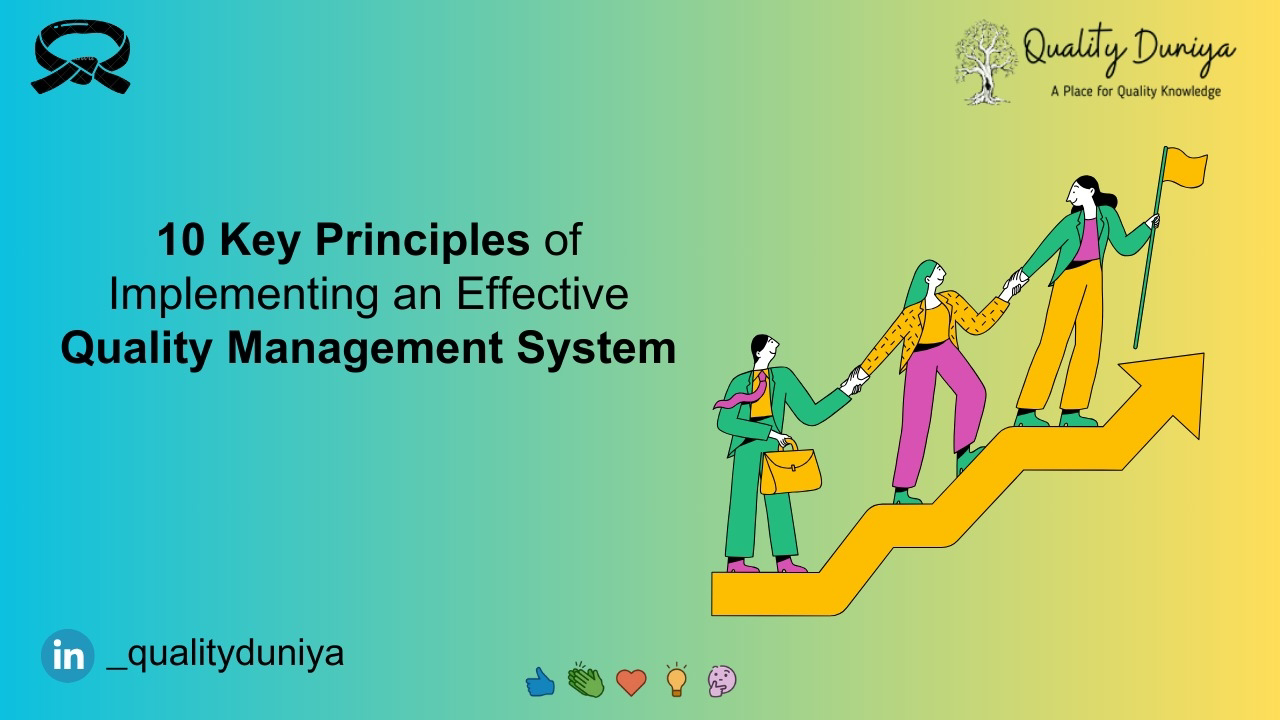10 Key Principles for Implementing an Effective Quality Management System - Quality Duniya
In today's competitive business landscape, maintaining high-quality standards is not just a goal; it's a necessity for success. A robust Quality Management System (QMS) serves as the backbone of any organization striving for excellence. From enhancing customer satisfaction to optimizing processes, implementing an effective Quality Management System (QMS) is pivotal.
A well-designed Quality Management System (QMS) can enhance efficiency, reduce costs, and most importantly, elevate the quality of products and services. In this article, we'll deep dive into the 10 key principles that pave the way for a successful Quality Management System (QMS) implementation, ensuring sustainable growth and continuous improvement.
10 Key Principles for Implementing an Effective Quality Management System
1. Clear Leadership Commitment
The journey towards a successful Quality Management System (QMS) begins at the top. Top management must demonstrate unwavering commitment to quality improvement initiatives and actively engage in the Quality Management System (QMS) implementation process. Their visible support encourages employee participation and fosters a culture of quality excellence.
2. Strong Customer Focus
Understanding and meeting customer needs is paramount. A customer-centric approach ensures that processes and products align with customer requirements. Regular feedback mechanisms and market research aid in identifying evolving customer expectations, enabling continuous improvement.
3. Systematic Process Approach
Adopting a process-oriented mindset streamlines operations and enhances efficiency. Map out key processes, identify interdependencies, and establish clear procedures to ensure consistency and reliability in outputs. Continuously monitor and refine processes to optimize performance.
4. Employee Involvement and Empowerment
Employees are invaluable assets in the pursuit of quality excellence. Encourage their active participation by fostering a culture of collaboration, ownership, and continuous learning. Empower employees with the authority, resources, and training necessary to contribute effectively to QMS objectives.
5. Continuous Improvement Culture
Embrace the philosophy of continual improvement as a cornerstone of the QMS. Implement methodologies such as Plan-Do-Check-Act (PDCA) or Six Sigma to systematically identify areas for enhancement, implement corrective actions, and monitor results. Encourage innovation and creativity to drive sustainable improvement.
6. Data-Driven Decision Making
Data serves as the foundation for informed decision-making. Utilize Key Performance Indicators (KPIs), metrics, and statistical analysis to monitor process performance, identify trends, and make data-driven decisions. Leverage technology to collect, analyse, and visualize data effectively.
7. Supplier Partnership
Suppliers play a crucial role in the quality chain. Establish strong relationships with suppliers based on mutual trust, transparency, and shared quality objectives. Collaborate closely to ensure adherence to quality standards, timely delivery, and continuous improvement throughout the supply chain.
8. Risk Management
Proactively identify, assess, and mitigate risks that could impact product quality or organizational objectives. Implement risk management frameworks to anticipate and address potential threats effectively. Regularly review risk assessments and update mitigation strategies as necessary.
9. Documented Processes and Procedures
Documentation serves as the backbone of the QMS, providing clarity, consistency, and accountability. Develop comprehensive manuals, standard operating procedures (SOPs), and work instructions to guide employees in executing tasks accurately and efficiently. Regularly review and update documentation to reflect evolving processes and best practices.
10. Compliance and Certification
Ensure compliance with relevant regulatory requirements and industry standards applicable to your business. Pursue certification to internationally recognized quality standards such as ISO 9001 to demonstrate commitment to quality excellence and enhance credibility in the marketplace.






Post a Comment